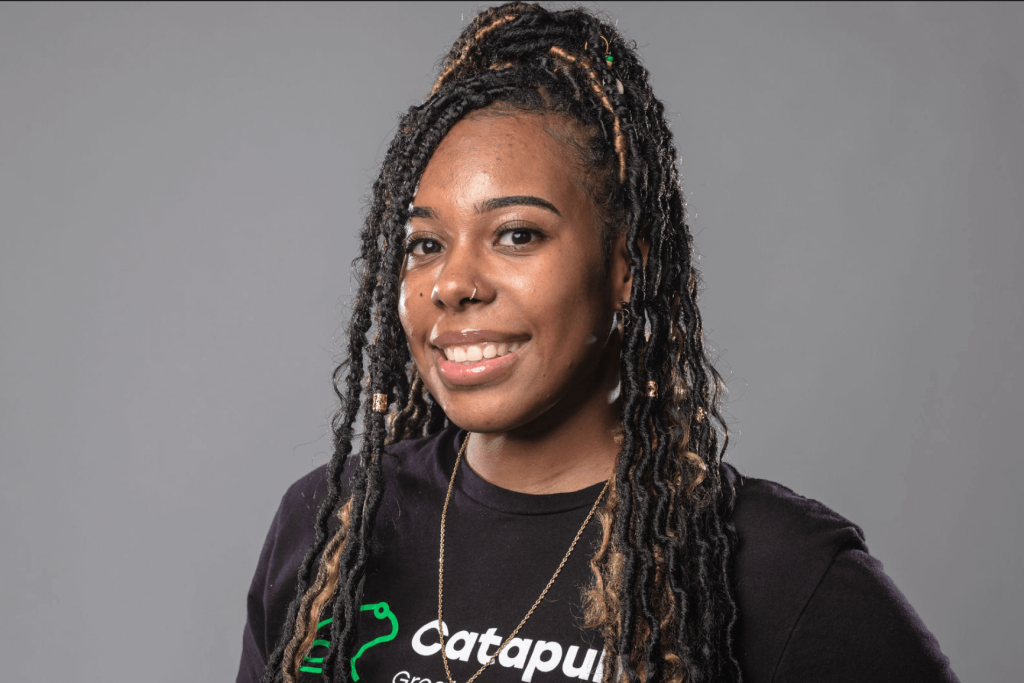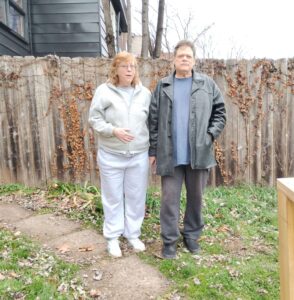At Catapult, we set ambitious goals. Our mission is to empower historically excluded communities to achieve economic justice and live dignified, equitable lives — in Pittsburgh and beyond. But creating lasting, systemic change starts with the individuals on our team. That’s why we’re dedicated to fostering a supportive, values-driven culture and bringing in people who are genuinely passionate about our vision.
Amekha Davidson, a financial education counselor here at Catapult, is a powerful example of that commitment. Since joining our team in April of last year, Amekha has embodied our values of compassion, flexibility, and innovation. In her role, she serves as a mentor for participants in our financial education program, S.A.V.E. (Solid Advice for your Valuable Earnings). Whether someone is looking to build their financial skills or pursue long-term goals like homeownership, S.A.V.E. is the first step.
Through this program, Amekha and her fellow counselors provide one-on-one guidance and tools to help community members feel informed, confident, and in control of their financial journeys. Using Catapult’s trauma-informed approach, they address the root causes of financial hardship — including generational poverty — with care and empathy.

In the Q&A below, Amekha shares more about her journey, a look into her day-to-day, and what she sees as the key to helping people truly transform their relationship with money.
We’d love to hear a bit about your journey — where did you grow up, and what led you to work in financial education counseling?
I was born in Pittsburgh but spent most of my life in Charlotte, North Carolina. In 2017, I moved back to Pittsburgh and had my son here. At first, I worked in the insurance department at UPMC, but after the pandemic, I realized it just wasn’t the right fit. I started exploring other opportunities and ended up as a health unit coordinator in the Neonatal Intensive Care Unit at the Children’s Hospital of Pittsburgh. That’s where I discovered how much I enjoy supporting people emotionally. It was tough — many families were facing serious challenges — but being there for them was incredibly meaningful. Still, the 12-hour shifts made it hard to be present for my son, so I started looking for something that better aligned with his schedule. That’s when I came across Catapult. I interviewed for an intake coordinator position and met with Jodi. The interview went well, but I didn’t have enough nonprofit experience yet. However, I was so inspired by Catapult’s mission that I made it my goal to be ready when the next opportunity came.
I spent the next two years working at the Housing Authority of the City of Pittsburgh as an occupancy specialist, which allowed me to stay close to the community and help in a different way. When another position opened up at Catapult, I reached out to Jodi. We had a conversation, and she invited me into the office during a director’s meeting. Not long after, they offered me the role I have now. Alongside my work, I recently finished my associate’s degree in social work and am currently pursuing my bachelor’s in human resources.
What does your day-to-day look like as a financial counselor at Catapult?
My day usually starts around 9:30 am. I take time to prep for my first session — whether it’s an intro, budget, or credit session. That includes organizing my paperwork, reviewing notes, setting up the databases I need, and answering any emails I can before I begin. By 10 am, I’m on Zoom with my first participant. We talk for about an hour, and once the session wraps up, I write my notes, update the necessary databases, and send any follow-up emails. Then it’s on to the next session. I typically meet with participants from 10 am to 1 pm. Most of my day revolves around these conversations — whether I’m helping someone with budgeting, walking through their credit, or just sharing information about what Catapult offers. I make sure to give them the support they need so we can keep moving their goals forward.
Who are the participants you're helping? And what are some of the common challenges you're supporting them with?
I work with people from all walks of life. Many are starting over after long-term marriages — women and men who are rebuilding their lives with their children and figuring things out on their own for the first time in years. I also support participants on fixed incomes who are still striving to build generational wealth or show their children that homeownership and financial stability are within reach.
Some participants come in with decent credit scores and savings, but they just need guidance and encouragement to believe that their goals — like buying a home — are truly possible. One thing I often hear is, “I don’t think I can do this.” Even when people have the tools, knowledge, or resources, the belief isn’t always there yet.
I once worked with a woman who started with just $200 in savings. By the time we finished working together, she had $1,500. It wasn’t a huge amount, but for her, it was transformational. She had never been able to save before, and together, we found ways to make it happen. That shift in mindset — realizing she could do it — was everything.
A big part of my role is reminding people to give themselves grace. Maybe today wasn’t the best day, but tomorrow is a new chance. We’re often our own harshest critics, and that’s why having someone on the outside looking in can make such a difference. I see their effort, their ambition, their heart — and sometimes, they just need someone to say, “You’re doing a good job.”
Is there a process that you follow for every person, or does it change based on each participant?
While there is a general journey we follow with each participant, the process looks different for everyone. Every person brings their own financial background, upbringing, and current circumstances, so there’s no one-size-fits-all approach. My ultimate goal is to help participants reach the finish line — typically homeownership — but how we get there depends on the individual. Some people need a clear, structured approach while others may just need a space to vent and talk things through. I adjust based on what each person needs most.
What are some of the main financial skills you’re working on with participants?
The biggest ones are saving and shifting their mindsets around money. I teach participants to think of savings as something you “pay back” when you dip into it, just like you would with any other expense. It’s about building the habit of replenishing, not just spending. We also talk a lot about people’s relationship with money — recognizing emotional triggers and understanding where their financial habits come from. A lot of our behaviors are shaped by what we saw growing up. I like to share things that I’ve gone through or things that I’m still working on to make people feel a little more comfortable. For example, I may share how I can sometimes use shopping as a way to deal with emotions, because that’s what we did in my family growing up.
One of the essential tools I teach people to use is a spending tracker. Writing down what you spend helps you see your habits, instead of guessing. I tell participants: don’t ignore your money. Look at it. Scrutinize it.
The more you know about how and why you spend, the more power you have to align your money with your goals.
What do you think makes Catapult’s financial education program unique?
The biggest thing that stands out to me is our trauma-informed approach. The first topic I always cover with participants is “emotions, values, and cultures.” In that session, we start to unpack the traumas behind some of the decisions we’ve made or the patterns we’ve developed. A lot of times, we don’t realize that our financial choices are rooted in trauma. For example, someone might want to become a homeowner because they had a landlord who was a slumlord. Now they’re thinking, “If I own my home, I won’t have to deal with that anymore.” But really, they’re reacting to a traumatic experience — and the question becomes: are you using the right tools and logic to figure out if homeownership is truly right for you? Because, as great as it sounds, it’s not always the easiest journey.
What I love most about Catapult is that we’re all human, and we bring that humanness into our work. We lead with our hearts and our empathy. We use the same skills we use every day as moms, friends, sisters, and daughters when we talk to participants, because they’re just like us.
What does success look like for you?
For me, success is the connection I build with participants — the aha! moments that people get when I’m having conversations with them or the goosebumps I feel when someone says, “I didn’t think about it like that,” or “Thank you for making this conversation feel safe.” That’s what keeps me going. Talking about finances — especially as a Black woman, who make up a large part of our participant base — can be really vulnerable. We are often the head of the household, the ones that are holding everything together, and we can’t break. So when someone opens up, it means everything.
I’m also just incredibly grateful to be at Catapult. The leadership, the culture, the focus on work-life balance and mental health — it’s all been so amazing. I’ve grown so much here, both professionally and personally, and I’m proud to be part of the vision Tammy has created.





